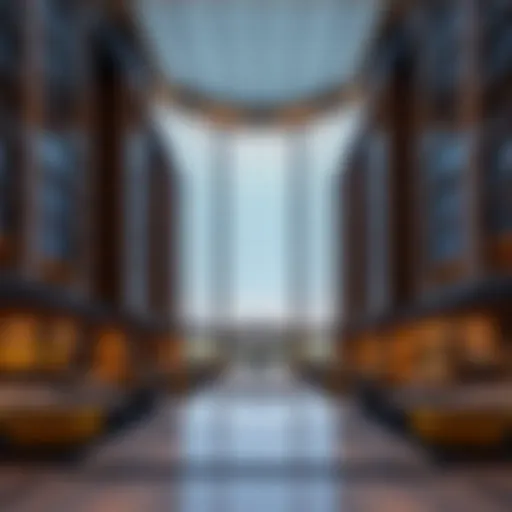Discovering New Real Estate Trends in Dubai
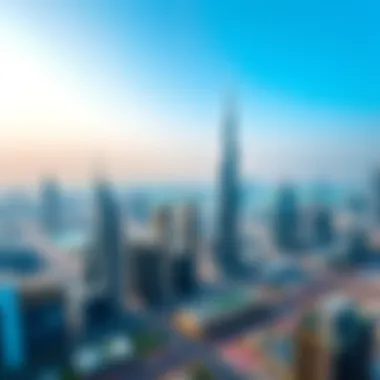
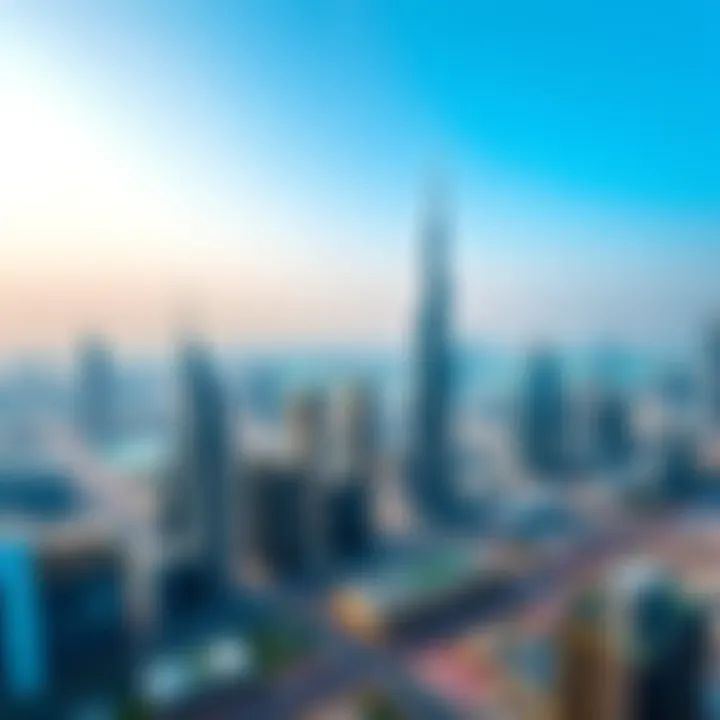
Intro
Dubai, often viewed as a thriving metropolis where luxury meets innovation, is presently undergoing a remarkable transformation in its real estate market. As the city continues to grow and evolve, understanding the pulse of its property sector is essential for investors, homebuyers, and real estate professionals.
In this overview, we will navigate through the rich tapestry of new developments reshaping Dubai's skyline. These projects not only showcase architectural marvels but also reflect broader socio-economic trends influencing the regional market. We'll break down the current market state, highlight emerging neighborhoods, and provide practical guidance for navigating the buying and selling process. This article aims to shed light on the crucial elements that are setting the stage for the future of real estate in this vibrant city.
Preface to Dubai's Real Estate Landscape
Dubai's real estate market is often regarded as one of the most dynamic and fast-evolving in the world. The city's landscape, characterized by iconic skyscrapers and luxurious developments, draws interest not just from local investors but from global players as well. The importance of understanding this landscape cannot be overstated— it provides crucial insights into potential opportunities and challenges that buyers, sellers, and stakeholders face.
The real estate sector reflects broader economic conditions, making it a key barometer of Dubai's overall health. Tracking shifts in market trends and historical context is essential for making informed decisions. For instance, shifts in demand can signal changes in lifestyle preferences or economic conditions, while historical insights reveal how past phenomena shape current characteristics.
Historical Context
To truly comprehend Dubai's real estate scenario, one must first look at its historical foundations. The city's real estate journey took a significant turn in the early 2000s when the government eased ownership regulations and promoted foreign investment. This transition marked a flourishing period, igniting property construction and enabling a myriad of projects like Emirates Hills and Dubai Marina, which laid the groundwork for today’s market.
From its humble beginnings as a trading port, Dubai has transformed into a metropolis replete with luxury. The discovery of oil in the 1960s provided the financial backbone for its rapid growth, but it was the strategic vision to diversify its economy that truly set the stage for its booming real estate sector. The drive to develop not just residential units but also commercial spaces such as the Dubai International Financial Centre (DIFC) reflected this evolution, catering to a burgeoning population and an influx of expatriates.
Current Market Trends
Today, the real estate market in Dubai is marked by several noteworthy trends. There’s an increasing shift towards sustainability, with developers integrating eco-friendly designs and smart technologies into new projects. More buyers are prioritizing properties that not only offer luxury but also adhere to environmentally sustainable practices. Some developments, like the sustainable district of The Sustainable City, epitomize this trend.
Furthermore, remote work patterns sparked by the pandemic have led to higher demands for larger living spaces and amenities that accommodate a home office or leisure activities. As the population expands, areas like Dubai South and Dubai Creek are seeing transformative projects tailored to appealing to new lifestyle demands.
The luxury segment remains robust despite global economic fluctuations, thanks in part to Dubai's tax-free status and its position as a safe haven for investments. Trends reveal a growing interest in high-end villas, particularly those with access to waterfront views, as buyers seek serenity amidst a bustling world. Investors are also keen on exploring off-plan properties that promise high returns, particularly in emerging neighborhoods like Jumeirah Village Circle and Business Bay.
In summary, understanding the historical context and current market trends provides a critical lens through which to view the future of Dubai's real estate landscape. A well-informed approach can help stakeholders navigate potential pitfalls while capturing lucrative opportunities.
Major New Projects in Dubai
The realm of real estate in Dubai is not just about buildings; it’s about creating experiences, evolving lifestyles, and redefining how people interact with their living and working spaces. The significance of this section underlines the innovative spirit that fuels every corner of the city. As Dubai embraces its expansion, understanding the major new projects leads investors and stakeholders to better anticipate shifts in the market. With each new development, there are benefits and intricate considerations that must be weighed carefully.
The ambitious projects coming to life here are a testament to the city's aspiration to remain a global hub of commerce and tourism. They not only symbolize architectural marvel but also create opportunities for profitability and growth in the real estate market.
Dubai Creek Tower
Dubai Creek Tower is poised to be more than just another skyscraper; it aims to be a beacon of innovation. Designed to surpass the height of the Burj Khalifa, it serves as a clear message about Dubai's ambition to challenge the status quo. The tower’s design is inspired by the lily flower and features a slender, elegant structure that is visually astonishing and functional.
Beyond aesthetics, this project is integral in further developing the surrounding area into a commercial and cultural enclave. It will enhance tourism, contributing significantly to the economy. Dominating the docking area near Dubai Creek, it brings an array of entertainment features, including observation decks with panoramic views that promise to attract both locals and tourists alike.
"As Dubai continues to advance, landmarks like the Dubai Creek Tower not only define the skyline but also shape new opportunities for investment and growth."
The Museum of the Future
The Museum of the Future presents a profound exploration of how Dubai envisions its role in the world of innovation and creativity. This isn’t just a museum; it’s a conceptual space dedicated to showcasing cutting-edge technologies and futuristic ideas. The structure itself is an architectural wonder, featuring a toroidal shape adorned with Arabic calligraphy.
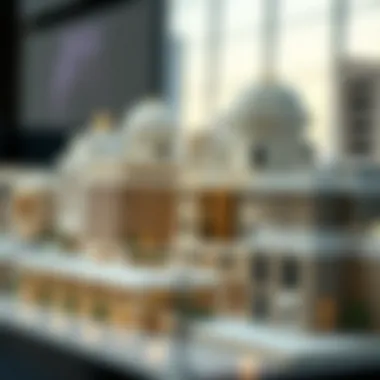
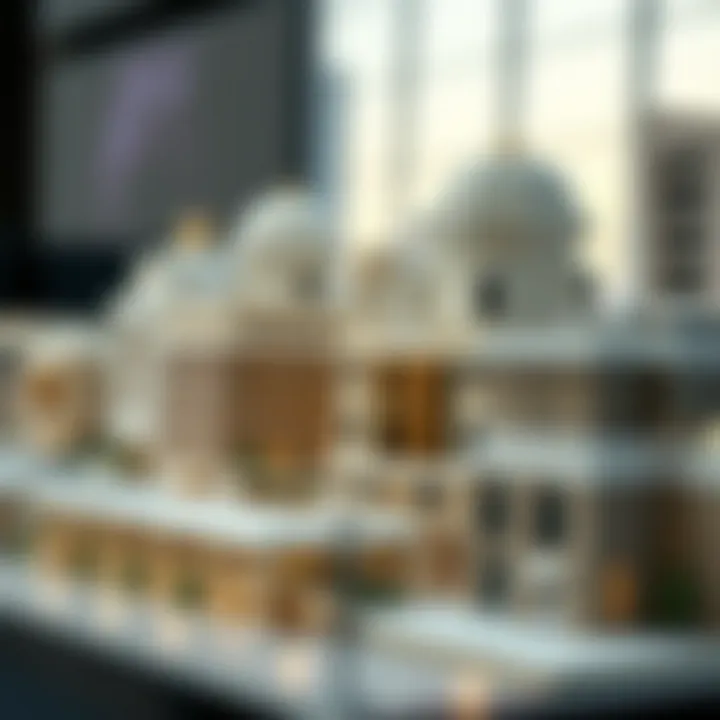
This project aims to ignite conversations about future possibilities in various sectors such as healthcare, transportation, and sustainability. By bringing the latest in advanced technologies and ideas under one roof, it positions Dubai as a leader in innovation and knowledge sharing. Real estate investors should note that such a cultural asset contributes to the local economy and attracts businesses looking to connect with the innovative spirit of the city.
Dubai Harbor
Dubai Harbor can be seen as a residential and commercial revolution by the sea. More than just a marina, it's designed to expand the waterfront lifestyle that Dubai has to offer. Encompassing luxury residences, hotels, and retail spaces, the project aims to create a vibrant community that appeals to both residents and tourists.
For investors, Dubai Harbor represents a unique opportunity in the maritime and hospitality sectors. The inclusion of a massive cruise terminal is designed to accommodate the growing number of cruise passengers visiting the city, thereby doubling down on the promise of lucrative returns. This project not only expands real estate options but also invites a larger audience to experience what Dubai has to offer.
The developments in this section underscore Dubai's commitment to progress and how new projects can transform the landscape of opportunities in the city.
Investment Opportunities
In today’s fast-paced world, the real estate market in Dubai is a treasure chest brimming with possibilities. Investors, from seasoned veterans to first-timers, are increasingly eyeing the city for its promising returns. Understanding the nuances of investment opportunities here is crucial, especially given the dynamic landscape shaped by various factors.
Investing in Dubai’s real estate isn’t just about purchasing a property; it’s about entering a thriving economic hub. The city boasts a tax-free environment and a stable currency, enticing investors to plant their financial flags firmly. Moreover, the potential for high returns can make every dirham spent feel worthwhile.
Benefits of Investing in Dubai
- Tax Incentives: Property buyers benefit from zero property tax, which can sweeten the deal, making investment more lucrative.
- Strong Rental Yields: In many neighborhoods, rental yields can reach 7-10%, depending on the area and type of property. This strong performance further solidifies Dubai's position as a global player.
- Growing Demand: With a continuously increasing population and influx of expatriates, the demand for housing is on the rise. This creates a vibrant rental market and enhances property value.
However, with opportunity comes responsibility. Investors should be aware of market dynamics, economic shifts, and legal considerations that could affect their investment. Staying informed can mean the difference between reaping rewards and facing setbacks.
"With Dubai’s commitment to innovation and sustainability, the real estate market is not just about bricks and mortar; it’s about vision and foresight."
High-Return Areas
When discussing high-return areas in Dubai, certain neighborhoods consistently stand out. For instance, places like Dubai Marina and Downtown Dubai have become synonymous with lucrative investments. The high demand for properties ensures that these areas experience a substantial appreciation in value.
- Dubai Marina: Home to luxury apartments, waterfront views, and a vibrant lifestyle, this area attracts high-end renters and buyers alike. Its connectivity to public transport enhances its appeal.
- Downtown Dubai: Often termed the heart of the city, it is home to iconic landmarks like the Burj Khalifa. Owning property here not only promises high returns but also prestige.
- Palm Jumeirah: Famous for its opulence, the Palm is an investor's paradise, offering villas and premium apartments that attract affluent expats and locals.
Investing in these high-return areas can lead to substantial capital growth, especially as more developments emerge around them, increasing their value even further.
Emerging Neighborhoods
While established areas are alluring, emerging neighborhoods in Dubai present golden opportunities that should not be overlooked. These up-and-coming locales offer lower entry prices while holding the potential for significant future appreciation.
- Dubai South: Developed as a city within a city, this area includes the Al Maktoum International Airport. As infrastructure develops, so will property values.
- Dubai Production City: Previously known as International Media Production Zone, this area is evolving into a hub for media and business professionals, driving demand for residential options.
- Jumeirah Village Circle (JVC): Once considered an underdog, JVC is now experiencing rapid growth with new amenities and accessibility options attracting both home buyers and tenants.
Investing in these emerging neighborhoods offers not just a chance for growth but also a chance to be part of something as it develops. It’s taking a calculated risk that could pay off handsomely in the future.
As Dubai continues to enhance its real estate market with new developments and policies, those attuned to the many layers of investment opportunities will find themselves well-positioned to capitalize on what this vibrant city has to offer.
Government Policies and Initiatives
Government policies play a pivotal role in Dubai's real estate landscape, serving as the backbone that supports both local and foreign investments. These policies do not merely establish a framework; they create a conducive environment for growth and innovation. A clear understanding of these initiatives is essential for investors, agents, and stakeholders who seek to navigate this dynamic market.
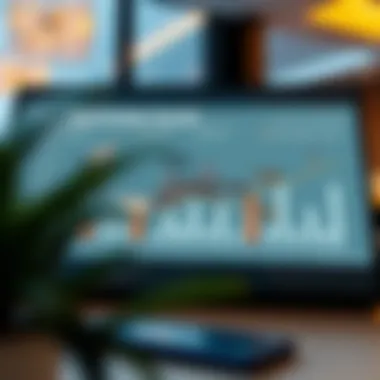

Visa Reforms
Recent visa reforms in Dubai have been designed to bolster its status as a global business hub. These changes aim to attract talent and investment, fundamentally altering the landscape for expatriates considering long-term stays in the emirate. Key reforms include:
- Long-Term Residency: The introduction of 5 and 10-year visas caters to skilled professionals, investors, and their families. This shift not only encourages people to settle but also engenders a sense of stability.
- Retirement Visa: Launched to draw retirees, this initiative allows those above 55 to reside in Dubai with a long-term visa, fostering a diverse community.
- Start-Up Visas: Aimed specifically at entrepreneurs, these visas are critical for nurturing new businesses while simplifying the process for securing residency.
Such reforms eliminate administrative hurdles, making it easier for individuals seeking to establish roots. They underscore a strategic shift towards creating an environment that attracts foreign talent while also ensuring economic diversification in line with Dubai's Vision 2021 goals.
Property Ownership Laws
Property ownership laws in Dubai have seen remarkable transformations in recent years, establishing a more transparent and inclusive framework for both local and international buyers. The evolution of these laws has resulted in a diverse spectrum of opportunities for investors. Key features of the updated regulations are:
- Freehold Ownership: Non-UAE nationals can purchase freehold properties in designated areas, offering more control over investments.
- Expanded Property Rights: Changes now enable extended rights for foreign investors, encompassing residential, commercial, and mixed-use projects.
- Regulation of Transactions: Improved processes around registration and transfer of property ensure legal clarity, minimizing disputes.
These laws foster confidence among investors and provide a legal safety net. The underlying intention is clear: attracting more foreign direct investment, ultimately transforming Dubai's real estate market into a vibrant, competitive sector.
The synergy between innovative visa reforms and robust property ownership laws significantly enhances Dubai's appeal as a prime investment destination.
Sustainable Development in Dubai
Sustainable development in Dubai is not just a trend; it is becoming a cornerstone of urban planning and real estate development. The importance of sustainability in this vibrant city cannot be overstated. As Dubai continues to evolve into a global hub for tourism, business, and innovation, the need to balance growth with environmental stewardship is critical. This section will explore the specific elements, benefits, and key considerations regarding sustainable development in Dubai, emphasizing how these efforts shape the future of its real estate landscape.
Green Building Standards
Dubai has taken significant strides in implementing green building standards that prioritize eco-friendly construction practices. One of the most noteworthy standards is the Dubai Green Building Code. This code mandates that all new buildings, whether residential or commercial, adhere to specific sustainability criteria. By focusing on energy efficiency, water conservation, and the use of renewable resources, Dubai aims to reduce the environmental footprint of its rapidly expanding skyline.
Key components of the Dubai Green Building Code include:
- Energy Efficiency: Buildings must meet stringent energy use benchmarks. Technologies such as energy-efficient HVAC systems and high-performance insulation materials are recommended.
- Water Conservation: Many developments are now required to install water recycling systems and use drought-resistant landscaping, reducing reliance on desalinated water.
- Sustainable Materials: The code encourages the use of materials that are locally sourced or recycled, minimizing transportation emissions and supporting local economies.
The impact of these standards is far-reaching, fostering not only a greener environment but also significant cost savings for owners through reduced energy and water bills. Moreover, environmentally-friendly buildings often see increased property values, making them a sound investment for owners.
"Sustainable practices not only resonate with the current global focus but also significantly enhance the desirability of a property in a competitive market."
Eco-Friendly Projects
In recent years, Dubai has initiated several eco-friendly projects that align with its vision for a sustainable future. One prominent example is the Sustainable City, a pioneering community designed to be self-sufficient in energy and water. This development incorporates:
- Solar Panels and Wind Turbines: Generating renewable energy for residents, making it less dependent on external power supplies.
- Green Spaces: Ample parks and recreational spaces are prevalent to promote biodiversity and improve residents' quality of life.
- Smart Technologies: Systems are implemented to monitor and optimize energy consumption, ensuring sustainability is seamlessly integrated into daily life.
Another noteworthy project is The Sustainable Arab Forest, an ambitious initiative aimed at restoring local ecosystems and reintroducing native plants. These projects not only contribute to environmental preservation but also set a precedent for future developments in Dubai.
Challenges Facing New Developments
Navigating the landscape of new developments in Dubai isn’t without its challenges. As entrepreneurs, investors, and stakeholders look to capitalize on opportunities, understanding the hurdles that can impede growth is vital. By scrutinizing these obstacles—chiefly economic factors and market saturation—one can take stock of the risks at play and strategize accordingly. This section will delve into these challenges, outlining how they affect not just individual projects but the real estate market as a whole.
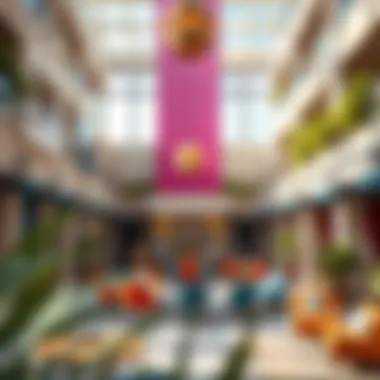
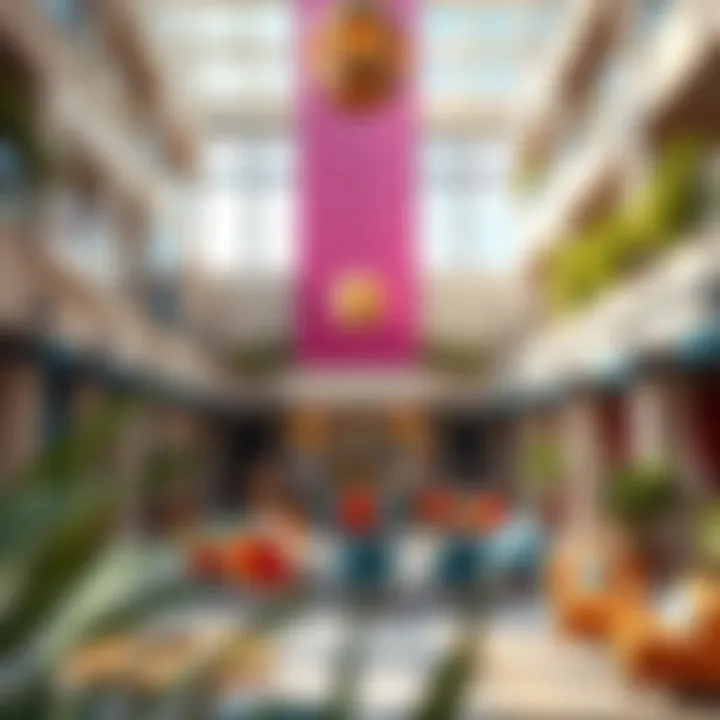
Economic Factors
The economic climate in Dubai has seen its fair share of ups and downs. Recently, the aftermath of global events—like the pandemic and fluctuating oil prices�—has left its mark on investor sentiment. In a city that thrives on its status as a commercial hub, the reliance on diverse economic sectors is paramount.
- Market Volatility: In a dynamic setting, developments could be delayed or downsized based on economic forecasts. Investors tend to hold back if there's a perception of instability, affecting project funding.
- Cost of Living: The cost of expatriation and living in Dubai continues to rise, which can deter potential residents and ultimately affect housing demand. If too many projects exceed the budget potentials of common buyers, it might lead to a backlash in sales.
- Financing Challenges: With banks tightening their lending criteria, potential homeowners may find it increasingly tricky to secure mortgages. This can lead to a slowdown in property purchases and a dip in market confidence.
Every economic downturn or unexpected event can ripple through the real estate sector, reshaping investor behaviors and project viability. As such, stakeholders must keep a finger on the economic pulse of the region, assessing how external conditions may play out in tandem with local ambitions.
Market Saturation
Dubai's real estate market, despite its earlier boom, faces the prospect of saturation. The onset of numerous high-rise structures and diverse developments has prompted a reevaluation of supply versus demand.
- Abundance of Inventory: With new residential, commercial, and mixed-use properties emerging at a rapid pace, it becomes critical to assess actual demand against available choices. When supply outweighs demand, properties could sit unsold, which can lead to price drops.
- Limited Unique Features: Many new projects resemble one another, offering limited differentiation. Buyers are not willing to invest in what they perceive as cookie-cutter developments without unique advantages or amenities.
- Rental Market Dynamics: Landlords might find it difficult to fill vacancies if potential tenants have numerous options to choose from. This could lead to price wars, putting downward pressure on rental rates and ultimately affecting long-term investment returns.
As market saturation intensifies, it becomes essential for developers and investors alike to be innovative in their offerings. Focusing on unique selling points, sustainability, and incorporating cutting-edge technology can differentiate a project in an overcrowded marketplace.
Through careful analysis of both economic factors and market saturation, stakeholders will be better equipped to make informed decisions in the real estate arena. Understanding these challenges does not merely serve to caution investors; rather, it can illuminate paths for competitive advantage and strategic development.
Future Outlook for Dubai's Real Estate Market
The future of Dubai's real estate market is a topic of significant relevance now, considering the rapid growth and transformation the city has witnessed. Real estate investors, agents, buyers, and analysts must have a keen understanding of where the market is headed to make informed decisions. Identifying long-term investment trends alongside projected developments allows stakeholders to strategize and adapt to the changing landscape. The evolving nature of the market highlights promising avenues for growth while also presenting potential hurdles that require careful consideration.
Long-Term Investment Trends
Dubai's vibrant real estate market possesses unique characteristics that create both opportunities and risks. Investors are increasingly drawn to long-term trends that signal where the market is going. These trends can be broken down into several key areas:
- Infrastructure Development: Ongoing government investments in infrastructure, such as new transportation networks and smart city technologies, enhance the appeal of various districts. Areas like Jumeirah and Dubai Marina particularly benefit from these enhancements.
- Sustainability Initiatives: As global awareness of climate issues increases, sustainable projects in Dubai become more attractive. Developments like The Sustainable City leverage green building techniques, providing long-term economic viability.
- Demographic Shifts: The influx of expatriates and a young population seeking affordable housing are shaping demand patterns. Properties with flexible layouts appealing to families and professionals are likely to see appreciation in value.
- Technological Integration: The incorporation of technology in property management and development is marking a shift toward smart living areas. Homes equipped with IoT devices are not only convenient but also add to the long-term value of investments.
These trends suggest that adaptability and forward-thinking strategies will be fundamental for anyone looking to navigate future investment spaces in Dubai.
Projected Developments
Looking ahead, several key developments are poised to redefine Dubai’s skyline and, consequently, its real estate market. Familiarity with these projected developments can offer clarity on investment opportunities:
- Dubai 2040 Urban Master Plan: Envisioning a more livable and sustainable city, this plan focuses on increasing green spaces and promoting mixed-use developments. Investors should watch how this blueprint ushers in residential and commercial projects that cater to an evolving demographic.
- Mohammed Bin Rashid City: This ambitious project aims to provide a new hub for luxury living and lifestyle experiences. Projects like the Dubai Hills Mall, and community-focused developments will arise, appealing to both high-end buyers and families.
- Bluewaters Island: Known for the iconic Ain Dubai observation wheel, Bluewaters Island offers residential and commercial spaces complemented by retail and leisure facilities. This mixed-use development is expected to become a prime investment locale, especially as it attracts more visitors and residents alike.
- The Expo 2020 Legacy: Although delayed, the preparation for Expo 2020 is reshaping areas around the Expo site. These developments promise to bring new lifestyle offerings and retail experiences, enhancing property values in nearby regions.
As these projections unfold, potential buyers and investors must keep their fingers on the pulse of emerging trends in design, marketing, and technology that will shape the future of Dubai’s real estate market.
In summary, the future outlook for Dubai's real estate market is one of potential growth, but it demands smart investment decisions and awareness of long-term trends and projected developments. Investors and stakeholders must remain vigilant, ensuring their strategies are aligned with the rapidly changing environment. For ongoing updates and insights, resources like Dubai Land Department can be invaluable.
The End
In wrapping up our exploration of new developments in Dubai, it becomes clear that the current landscape is not just about architectural marvels but also about the opportunities and challenges that accompany them. The transformation of Dubai's real estate is not merely a visual spectacle; it serves as a barometer reflecting economic vitality, investment viability, and social progress.
The significance of understanding these developments lies in their potential to reshape the future for investors, buyers, and stakeholders alike. Key takeaways from this discussion include:
- Investment Potential: High-return areas like Dubai Creek and emerging neighborhoods are hot spots that can yield substantial returns for both domestic and foreign investors.
- Policy Framework: The government’s supportive stance through creative policies and visa reforms reflects an easing path for ownership and investment, vital for long-term market health.
- Sustainability Focus: With a strong emphasis on sustainable projects, investors can find comfort in knowing that future developments are not only luxurious but environmentally conscious.
"As the city stands at the cusp of a new era of modernity and sustainability, the wise investor recognizes the importance of staying informed on market trends and government policies."
Moreover, it's imperative to consider the economic backdrop against which these developments are occurring. The flattened global economy, compounded by persistent market saturation issues, demands a nuanced understanding and a strategic approach to investment. These factors are crucial as they dictate market behaviors and property values, influencing decisions significantly.



